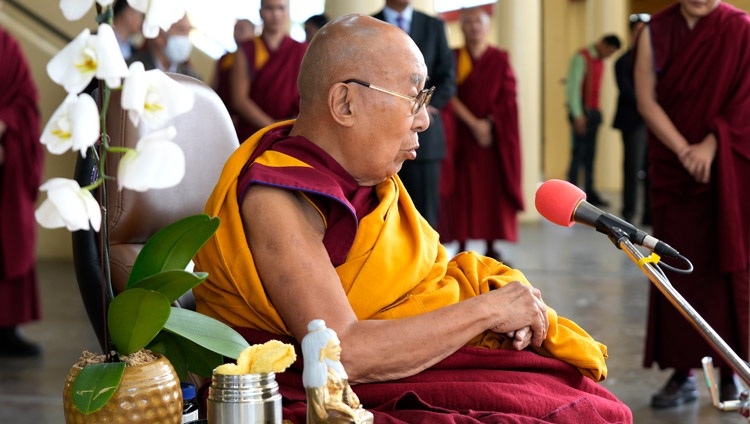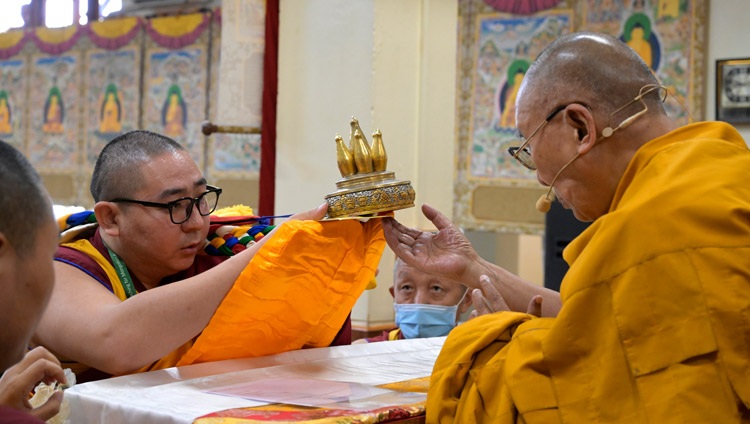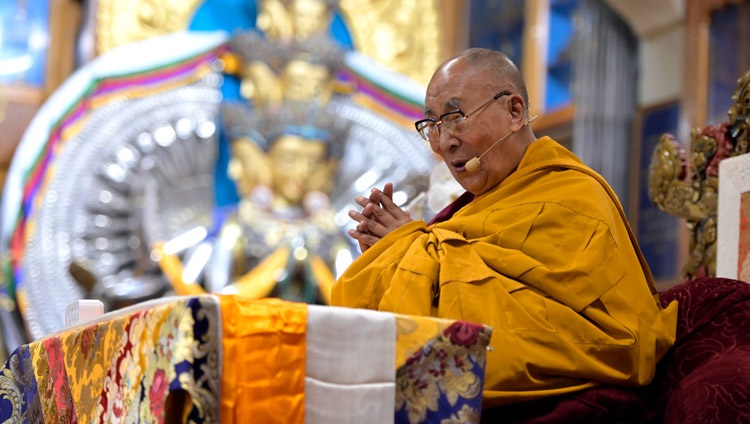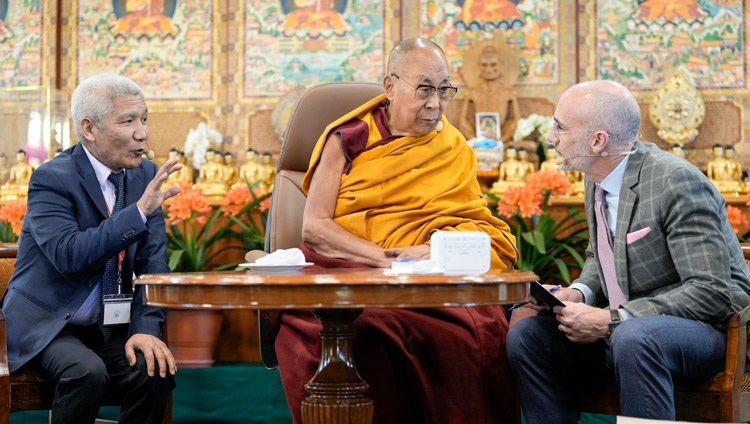Discussion with Groups from Harvard
Thekchen Chöling, Dharamsala, HP, India – Prof Arthur Brooks greeted His Holiness the Dalai Lama as he entered the meeting room this morning. Brooks told him that their 11-year-old friendship and collaboration had changed his life. He assured His Holiness that he and his friends from Harvard wanted to help spread his message.
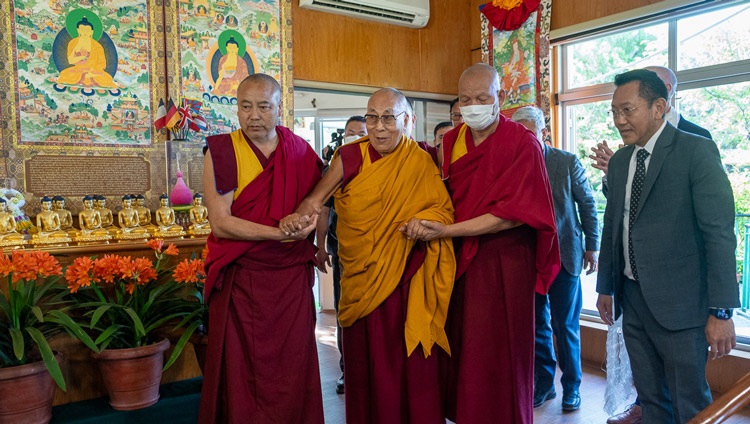
His Holiness the Dalai Lama arriving for his discussion with groups from Harvard University at the meeting room at his residence in Dharamsala, HP, India on April 8, 2024. Photo by Tenzin Choejor
“We want to lift people up and bring them together with science, ideas and spirituality. This is a message from the heart that we are trying to convey to the rest of the world.
“Buddhism teaches that there is suffering in the world, that life is suffering. There is widespread dissatisfaction. We are dissatisfied with ourselves, our lives and our possessions. When I seek Your Holiness’s guidance you tell me: ‘Remember that you are one of eight billion human beings. When you feel pain, cultivate compassion for others. When you feel hatred, show warm-heartedness. Concern yourself with spiritual matters rather than physical things.’
“We must transcend ourselves to find ourselves, so to focus on higher things, on other people, is our theme. We are going to talk about relating to other people today. Tomorrow we’ll talk about the universe.”
“One of the principal things I try to make people aware of,” His Holiness replied, “is that we were all born of a mother and during our infancy were nurtured in her care. We need to remember this. When we’re very small the intellectual side of our brains is not developed, but we are able to appreciate the care we were shown. This is true of other mammals too, even of aggressive predators like lions and tigers.
“We can see that people who were cared for when they were young grow up to be secure and at peace. Those that were separated early from their mothers reveal a sense of insecurity and unease later in life. In my own case, I had a truly loving mother.
“In the Buddhist tradition, and especially in the Tibetan Buddhist tradition, we cultivate a recognition of all sentient beings having, at some time, been our mother. This is a step in our training in universal compassion, a way to make a connection with all beings.
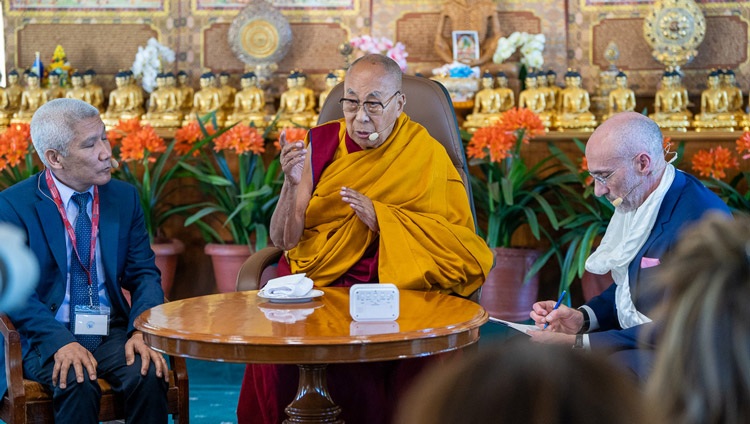
His Holiness the Dalai Lama speaking during the discussion with groups from Harvard University at the meeting room at his residence in Dharamsala, HP, India on April 8, 2024. Photo by Tenzin Choejor
“Our ability to love others is rooted in our experience as infants. Many people simply don’t appreciate the power of love. They are competitive in their pursuit of their own interests, whereas it is actually more effective to recognize and appreciate the kindness we receive from others.
“If you develop a more positive outlook in this way, you’ll find you’re more at peace with yourself and your relations with others will be more natural. If I compare myself to my predecessor, I connect with others quite easily, but the 13th Dalai Lama was different. Perhaps this relates to our different experience. I lost my country when I was young and as a refugee found I had more opportunity to interact with people from all walks of life—much less formality.
“What’s important is to appreciate the kindness, love and compassion you receive. Nearly all the problems we human beings create derive from a lack of consideration for others.
“In the Buddhist practice of cultivating compassion, we build on the natural capacity we receive from our mothers at the start of our lives. We make a connection with others and generate a sense of gratitude towards them. When we think of others in terms of ‘all mother sentient beings’ there is no room for anger or hatred.”
Brooks asked, “What do you do when you find it’s hard to love someone?”
His Holiness answered, “Sometimes you must first cultivate a sense of equanimity and based on that develop affection and consideration.
“When I met Chairman Mao Zedong, he commented on my scientific outlook but also remarked that cultivating love for others was unimportant. But how could he have been happy without any sense of trust or affection for those he worked with, the members of his inner circle? Power alone is not enough to make us happy. I believe that if he were alive today, he’d change his mind. The crucial thing in our person-to-person relations is to make a connection.”
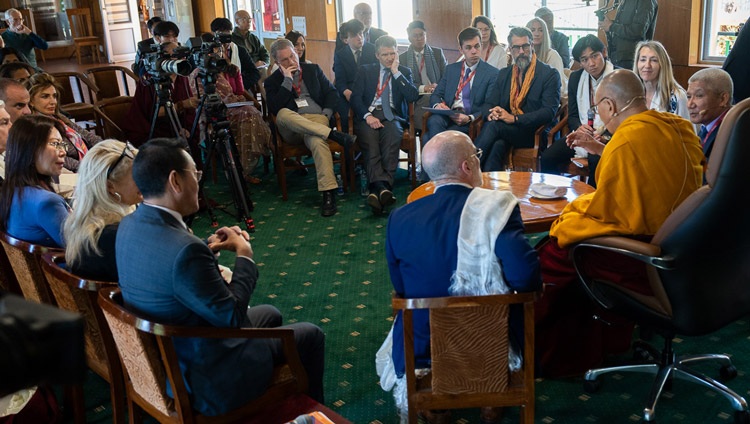
A view of the meeting room at His Holiness the Dalai Lama’s residence during the discussion with groups from Harvard University in Dharamsala, HP, India on April 8, 2024. Photo by Tenzin Choejor
Brooks wanted to know whether you can decide to love someone when in fact you don’t feel it. His Holiness replied that we have to use our intelligence to understand the value of warm-heartedness towards others.
Psychologist from California Sonja Lyubomirsky, who does research into the effect being generous to other people has on us, asked how we can focus on others in daily life. His Holiness suggested that if we observe animals, we can see how they have a group cohesion that is dependent on the care and affection that exists between them. This is true even among predators that rely on eating other creatures.
“Our intelligence puts us human beings at an advantage. We can understand the power and value of connection and kindness. When I was a small child in North-eastern Tibet the majority of the local population were Muslims so there were social differences between us, but affection within the community was strong and we had good relations with each other. We children played with each other quite unselfconsciously. We need to remind ourselves that fundamental kindness and affection are part of human nature.”
A student called Tenzin Lodoe asked what the education system can do to help young people with emotional and mental problems. His Holiness expressed concern that modern education seems to focus on fulfilling self-interest without encouraging corresponding attention to social connections. In reality, he said, the important thing in today’s world is how we connect with each other as human beings. All of us want to live in a more peaceful world, but if we don’t connect with each other there is no basis for peace.
“From my point of view, when I think of the situation in Tibet, I realize we have to pay special attention to those who have caused such trouble there. I reflect on what we call the four immeasurable wishes:
I will cultivate [love wishing] that sentient beings have happiness,
[Compassion wishing] that they be free from suffering
Joy in their abiding forever in bliss,
And equanimity devoid of attachment or aversion.
“To think, ‘May all beings find happiness and its cause’, is very powerful. So, when I think of the suffering and destruction the Chinese communists have brought about I realize that their actions are founded in ignorance. Tibetan culture, on the other hand, is rooted in kindness, love and compassion.”
Brooks sought advice on ways to teach others the importance of love.
“The key point is to recognize that the more you care for others the greater will be your own sense of peace,” His Holiness responded. “It’s quite clear that where there is less kindness in the world, there are more problems. When we talk about love, kindness and compassion, it’s not a religious matter. It’s part of the fundamental reality of relations among social creatures. Problems arise when we are unkind. That’s why we need more kindness in the world.
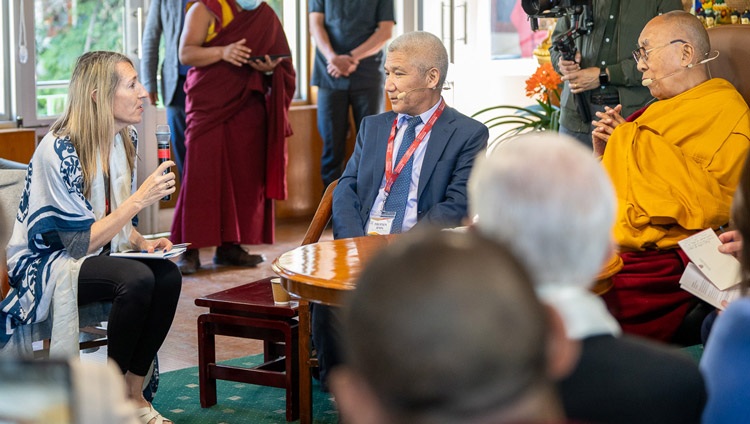
A participant in the discussion with groups from Harvard University asking His Holiness the Dalai Lama a question during their meeting at his residence in Dharamsala, HP, India on April 8, 2024. Photo by Tenzin Choejor
“You young people are training as leaders. It’s important for you to recognize that love and compassion have a role to play in who we are as human beings. We all want to be happy not sad. This is a wish we have in common. We survive because of the care of others.
“Many political ideologies are based on emphasizing differences between ‘us’ and ‘them’. This is contrary to our basic kind and affectionate nature. Having come to India as a refugee and travelled widely around the world, I’ve come to understand that we human beings are all the same; we share a common experience. And recognizing this brings me peace and joy. When we see that other human beings are just like us, love and compassion for them comes easily.
“If we focus instead on religious or political differences between us, we only increase our feelings of alienation and division. The crucial thing is to see that we are the same as human beings.”
Arthur Brooks summarized the morning’s proceedings in six lessons. The first was that although we might think that love is our goal, it’s actually the beginning. Secondly, the point is to love others. Thirdly, forgetting to love others is an easy mistake to make, especially when selfishness seems to be effective. However, when His Holiness says ‘May all beings be happy’, it involves remembering how they have been as kind to us as our mother and feeling grateful for it.
Fourth, the proper response to understanding that people do harm out of ignorance, is to resolve to show them love. Fifth, to be effective leaders teaching about love, we need to make an authentic connection with other people. Lastly, the sixth lesson was that the biggest problem in the world is the illusion of ‘us’ and ‘them’, a failure to acknowledge how interdependent we are.

